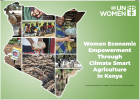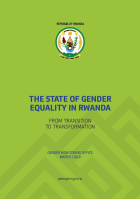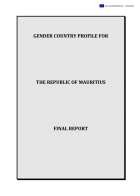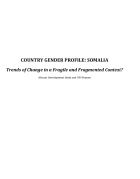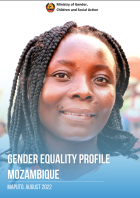1 - 11 of 11 Results
Date:
The WEE-CSA Storybook showcases the success stories of over 2,400 women from Kitui, Laikipia, and West Pokot who have transformed their lives through climate-smart agriculture. Funded by KOICA and implemented by UN Women Kenya, it highlights the project's impact on livelihoods and gender equality while sharing valuable lessons learned. This collection celebrates resilience and aims to inspire further community upliftment for sustainable development in Kenya.
Date:
Empowering women, building resilience: A UN Women and FAO Kenya project tackles climate challenges in arid regions. The initiative equips them with climate-smart agriculture skills, boosting incomes, nutrition, and their voice in agricultural policies. This collaborative effort fosters a future where women are key players in building sustainable livelihoods that thrive despite climate change.
Date:
This publication highlights the progress and prevailing gender gaps in Rwanda so far as far as Gender Equality and Women's Empowerment is concerned. It also gives insights into the state of gender equality in the National Strategy for Transformation (NST1) pillars.
Date:
The Gender Country Profile publication for the Republic of Mauritius documents the progress achieved towards the attainment of gender equality and examines how far the Republic of Mauritius has been able to address gender gaps and empowerment of women in line with the various regional and international conventions ratified.
Date:
The publication presents a Country Gender Profile for Somalia examining core trends in gender and inclusion, new policies and legalisation, and institutional capacity to promote gender equality, particularly in a fragile and fragmented context, with change and progress assessed since 2012.
Date:
This publication discusses the country's progress with regard to gender equality and the empowerment of women and girls in the different spheres considering the commitments assumed by the Government of Mozambique.
Date:
This publication describes the UN Women Rwanda Office's effort in dealing with Gender-Based Violence (GBV) victims using different approaches in both GBV prevention and response. It also provides success stories from different beneficiaries in relation to legal assistance which showed that in most cases it requires strong courage from the victims to bring the perpetrators to justice especially in the context of negative cultural beliefs, women's economic dependence, fear of discrimination and stigmatization among other challenges. The document also highlights the role of mobile legal clinic in increasing the proximity of legal services to the community including awareness-raising and legal literacy.
Date:
This analytical study covered ten countries in the region and looked at issues of access to justice for women and girls in East and Southern Africa.
Date:
The purpose of this study was to develop a variety of texts documenting case studies of good and promising practices in the area of the protection of rights and access to services for women with disabilities in East and Southern Africa (ESA) during the COVID-19 pandemic.
Date:
This continental study provides a contextual analysis of the forced displacement of women and girls in Africa based on first hand data from field visits made to the Central African Republic, Ethiopia, and Nigeria. The analysis provides the key priority considerations for the realisation of durable solutions for refugees, IDPs and returnees in Africa and makes recommendations for actions by the AU, Member States and relevant stakeholders within the context of AGA and APSA.
Date:
This continental study provides a contextual analysis of the forced displacement of women and girls in Africa based on first hand data from field visits made to the Central African Republic, Ethiopia, and Nigeria. The analysis provides the key priority considerations for the realisation of durable solutions for refugees, IDPs and returnees in Africa and makes recommendations for actions by the AU, Member States and relevant stakeholders within the context of AGA and APSA.

